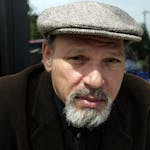I've probably already written "This is Tom Hanks' best performance" half a dozen times, but here I go again: In "A Beautiful Day in the Neighborhood," the two-time Oscar winner does career-peak work.
There may be an element of witchcraft in Hanks' Fred Rogers. He has done basic things to increase his resemblance to the TV icon/cardigan enthusiast: Hanks wears eyebrow wigs, approximates Rogers' slow, singsongy style of speaking and duplicates his clipped pronunciation of the word "neighbor."
But the performance is less an impression than a spirit summoning. It's as if Hanks tucks a cozy blanket around the entire film, embodying the beatific warmth and kindness of Rogers so that every time he appears on screen in "Beautiful Day," you feel better and more hopeful. (Now that Hanks has played Rogers and, in "Saving Mr. Banks," Walt Disney, he needs to complete the midcentury-guy-who-was-beloved-by-children-and-adults triumvirate by tackling Minnesota native Charles Schulz.)
Parts of Marielle Heller's movie are designed to feel like an episode of "Mister Rogers' Neighborhood," geared toward adults who need a little hope. It's a stranger movie than audiences are expecting, I suspect, because Heller makes such bold choices: shrinking characters so they fit into the neighborhood, where they interact with Rogers' puppets, and stopping the movie dead for a sequence I don't want to say too much about except that it's a risky attempt to break through the wall between movie and moviegoer, to ask us to think more like Mr. Rogers does. In other words: WWMRD?
Audiences also may be surprised to discover that Rogers is not the main character in "Beautiful Day." That would be Matthew Rhys' Lloyd Vogel, a fictionalized version of real-life reporter Tom Junod, who wrote about how being assigned to write a profile of Rogers changed his life, helping him resolve resentments from his childhood. Vogel — the character who grows in "Beautiful Day" — begins as a cynic who believes Rogers is putting on an act but gradually realizes he's a real human who is especially good at humanity. The Rhys stuff is fine but his is a predictable journey and every moment Rogers isn't on screen feels like an opportunity lost.
I suspect the folks behind "Beautiful Day" know that. It's why they've chosen to give Rogers the first and last words in the movie.
"We are trying to give children positive ways to deal with their feelings," Rogers tells Vogel early on. Since it's the feeling that Vogel is dealing with, a lot of the movie ends up being about figuring out what to do with anger.
That includes what Rogers does with his own anger.
This is where having an icon play another icon pays off exponentially, because we're given behind-the-scenes looks at two beloved figures at once. In the final scene, Hanks/Rogers is alone in a TV studio, where he sits down at a piano and blows off steam by pounding on the left side of the keyboard. The idea, I think, is that we are diminishing the humanity of beloved figures such as Hanks and Rogers if we fail to recognize that they have pain and anger, too. They're not saints but if we're willing to listen to them, maybe their artistry can help us deal with our own darker moments.






